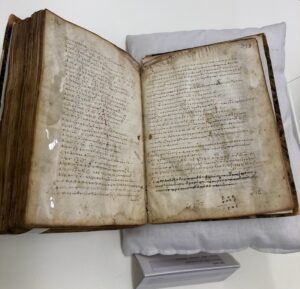
3 Reasons Why Believers Need the Guidance of Bible Scholars
In an authentic German pub a few years ago, I met John. We were fellow passengers traveling across Germany on a riverboat cruise. Over schnitzel and sauerkraut, I learned that John, a retired businessman, was on a quest to find the source of his prosperous life. He told me that, unlike others he knew, he had enjoyed incredible financial success, good health, and had a family he loved and who loved him. Listening to his story, I realized that John and I were having a divine appointment. I could almost hear his heart crying out to know the Truth. In our ensuing conversation, I shared a bit about the Way and suggested he read the book of John. Later, I prayed privately for John to begin reading the Bible and for someone to come alongside him to guide him to understanding.
My impromptu pub chat reminded me of a long-ago encounter. Are you familiar with the story of the Ethiopian eunuch, a treasurer for Candace, the Ethiopian queen, and his divine appointment with Philip (Acts 8:26–40)? Here is a summary:
In response to an angel’s summons and the Spirit’s urging, Philip approached an Ethiopian eunuch. Seated in his chariot in the desert between Jerusalem and Gaza, the official was reading the book of Isaiah. Philip asked him, “Do you understand what you are reading?” The Ethiopian replied, “How can I, unless someone guides me?” Philip explained the passage and continued with the good news about Jesus. Expressing belief, the eunuch asked Philip to baptize him.
Believers can benefit from a variety of guides to understand the Bible. I’ve gained valuable insights from Sunday School teachers, Bible study teachers, pastors, seminary professors, and from the writings and work of many Bible scholars. A friend, a woman who studies the Bible diligently, recently commented that she didn’t see the need to consult scholars for Bible interpretation. She reasoned that because “scripture interprets scripture,” meaning the Bible interprets itself, any clarity the reader might need is found within its pages and not from scholars. Indeed, scripture’s primary teaching on sin, forgiveness, grace, and salvation is readily understandable to the reader. Meanwhile, my friend’s comments prompted me to consider what Bible scholars bring to “the table,” in other words, how their work can and does guide us into a deeper understanding of the scriptures.
Three Reasons to Seek the Guidance of Bible Scholars
Here are three reasons why believers need the guidance of those who’ve invested in advanced biblical and theological studies aka Bible scholars:
1. Scholars Produce Bible Translations
The Bible in its original form is the inspired word of God—the truth that is reliable and authoritative—given to equip a believer for the Christian life. However, our Bibles don’t contain the pages of the original manuscripts. They are lost or hidden. Nevertheless, we have thousands upon thousands of copies of early manuscripts. The earliest New Testament fragments date to the first century, and some Old Testament fragments date around the fourth century BC. Therefore, the Bibles we have are Bible translations.
The original writings are inspired, but Bible translations are not. And, the reader can read them in a familiar language, like English, because scholars have studied the original languages the Bible was written in—Hebrew, Koine Greek, and Aramaic—and produced various translations.
The translators’ challenge is to discern the meaning of the words to the original writers and audience to enable an accurate translation into English. Significant to Bible translation work is the work of textual criticism. Textual criticism is a method used to decipher the content of the original Bible manuscripts. A textual critic examines multiple manuscripts to note differences, a process used to determine the most likely and correct wording. All Bible translations depend on the work of Bible scholars. This is a key reason why believers need the guidance and work of Bible scholars.

This photo is a visual presentation of scripture’s interconnections. Chris Harrison created this image, “the cross-references arc,” to visually show the nearly 65,000 cross-references throughout the Bible.[1] The bar graph at the bottom represents all the chapters in the Bible, and each of the cross-references has a single arc.
2. Scholars Guide Us in the Nuances of Biblical Interpretation
All Bible translation is an act of interpretation. Bible translations include many interpretative decisions, including word choices, and the addition of punctuation, chapter and paragraph divisions, and chapter headings. Therefore, interpretative decisions are baked into Bible translations. Let’s look at two examples:
The first example regards the creation of the English Standard Version (ESV) Bible. The all-male ESV editorial board created their translation to reflect a complementarian view of the relationship of men/husbands and women/wives. In essence, complementarians believe men are the leaders, and women support and submit to male leadership. This theological view contrasts with egalitarianism’s belief in shared authority between men and women. The Council for Biblical Manhood and Womanhood (CBMW) website describes the ESV as “unapologetically complementarian.”[2] The ESV translation committee brought their complementarian theology as an interpretative grid to the text. Read more about Bible translation issues here. The best practices approach to biblical interpretation looks for the context and consistency in the biblical story.
The second example is the insertion of words not found in the original text. In Greek, the indefinite pronoun tis means “someone,” “anyone,” or “a certain person” and doesn’t have a gendered form. Context is therefore essential to determine whether the proper usage is only men, only women, or both men and women. One key example is 1 Timothy 3:1: “If someone [tis] aspires to the office of overseer, he desires a good work (NET, emphasis mine).” The NET assigns a masculine pronoun to the ungendered tis. The ESV, HCSB, and NIV 1984 interpret tis as masculine and have inserted “he” into the text also.[3] Without an understanding of how the Greek language works, it would be easy for the reader to see the male pronoun and wrongly assume that this was the context of the verse to the original audience of readers.

Both of these examples point to the need for biblical scholars’ guidance to help the reader understand various interpretative challenges and illuminate the details of the spectrum of theological views. Terran Williams, a church leader from Cape Town, South Africa, explains, “I changed my mind about women leading in churches, mainly when I realized—after much research—that I had been relying on the popular mistranslation of just one rare Greek word in one biblical passage.”[4] Scholars have wrestled deeply with the biblical text. Their knowledge helps equip the reader to sift the scriptures with a keener eye and a more informed understanding of the nuances of biblical interpretation.
3. Scholars are Gifted to Build Up the Body
The Holy Spirit gives each new believer a spiritual gift(s). Peter explains the purpose of these gifts, “As each has received a gift, use it to serve one another (1 Pet 4:10). In several passages, Paul describes various lists of gifts. In Ephesians 4:11–12, he says some are given “as apostles, some as prophets, some as evangelists, and some as pastors and teachers, to equip the saints for the work of ministry, that is to build up the body of Christ (Eph 4:11–12).” Scholars, male and female, are gifted by the Spirit to understand the original languages, to write Bible translations, to highlight and explore interpretative issues, and to help guide us into a deep knowing of the scriptures. Valuable insights are gained by seeking knowledge from a diversity of scholars’ voices. And, in the example of the Bereans who listened to Paul and Silas’s message and then carefully examined the scriptures to verify what they heard (Acts 17:10–12), we should do likewise.
Conclusion
The Bible is complex and full of layered meaning. Understanding this, Peter writes, “Some things in these letters are hard to understand, things the ignorant and unstable twist to their destruction, as they also do to the rest of the scriptures. Therefore, dear friends, since you have been forewarned, be on your guard that you do not get led astray…and fall from your firm grasp on the truth (2 Peter 3:16–17).” My friends, let’s avail ourselves of the gifted guidance from diligent, dedicated, and faithful Bible scholars.[5]
[1]Chris Harrison, “Bible Cross-References,” chrisharrison.net. https://www.chrisharrison.net/index.php/Visualizations/BibleViz
[2] “Literary ESV is Unapologetically Complementarian,” cbmw.org, October 8, 2007. https://cbmw.org/2007/10/08/literary-esv-is-unapologetically-complementarian/
[3] Jeffrey D. Miller, “A Defense of Gender-Accurate Bible Translation,” In Discovering Biblical Equality. Edited by Ronald W. Pierce and Cynthia Long Westfall, 3rd ed., (Downers Grove, IL: Intervarsity Press, 2021), 483.
[4] Terran Williams, author of “How God Sees Women” and “What’s So Amazing About Scripture?” posted this statement on Facebook on February 9, 2024, to describe his new understanding of the word authentein.
[5] Some of my favorite scholars (in alpha order) are Ron Allen, Michael Bird, Katherine Bushnell, Lynn Cohick, Sandra Glahn, Carmen Joy Imes, Craig Keener, Amy Peeler, Lucy Peppiatt, Warren Wiersbe, and William Witt.




